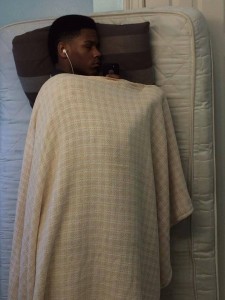
With the winter Olympics in Sochi just beginning, Twitter seems to be hosting an Olympics of its own in bathroom mirrors across the country. Aptly nicknamed the “Selfie Olympics,” the popular Twitter trend encourages people to photograph the most creative self-portrait they can muster. From silly to snarky, but oftentimes plain dangerous, the selfie potential is limitless.
While a small portion of more invested participants put their physical abilities to the test (until now, who knew people could do handstands on the sink and take a photo of it?), less serious participants are content just posing costumed (onesie, anyone?). The best part is, anyone can do it, provided they have a camera phone and a Twitter.
“It’s not actually a competition,” junior and participant Cassie Barrett said about the trend. “It’s just supposed to be entertaining and funny.”
Junior Jay Horne, who moved a bed into his bathroom to get a particularly unique picture, agrees.
“[The objective is] to see who can put the weirdest stuff in their bathroom,” Horne said. “It’s just for fun, and you can get really creative with it.”
With that being said, the more dangerous selfies have posed safety risks to teens.
“Some people are being a little too risky,” Horne said, commenting on rumored, but unconfirmed, deaths related to the competitive trend. “No one should hurt themselves over a selfie.”
After the word “selfie” was deemed Oxford Dictionary Online’s word of the year, the phrase was met with heavy controversy.
Many have responded to the global phenomenon negatively: one article from the Guardian titled “The selfie’s screaming narcissism masks an urge to connect” mocks the “me generation” for superficiality.
“Some of them are right,” said Horne, “[but our generation] isn’t really going downhill.”
Barrett, however, dismisses these opinions as overly-disparaging and hypocritical.
“They probably would have done the same thing,” Barrett said about the critics.
But, after the Selfie Olympics fades, as do all fads in due time, what will happen to the selfie? Is it just another stupid trend? Or is it something more significant?
“I could Google image search ‘the sky’ and I would probably see beautiful images to knock my socks off. I can’t Google, you know, ‘What does my friend look like today?’” lead singer of popular band Vampire Weekend, Ezra Koenig, said in an interview for Rolling Stone magazine. “For you to be able to take a picture of yourself that you feel good enough about to share with the world—I think that’s a great thing.”
That kind of technology is still a while away (take note, Google). In all seriousness, though, with all the controversy surrounding selfies, they are unlikely to disappear any time soon. Whether they’re an abomination or just a more modern means of communication, the practice of taking selfies has undoubtedly brought a new level of intimacy to the internet. It’s easy to dismiss the idea of communication through the screen of an iPhone or computer as superficial and vapid. But if you imagine hundreds of teens across the world taking a moment to share themselves, to share a laugh, to put themselves out there and invite the world into their bathroom, selfies become a much more powerful force in both the reaches of youth and technology users.
